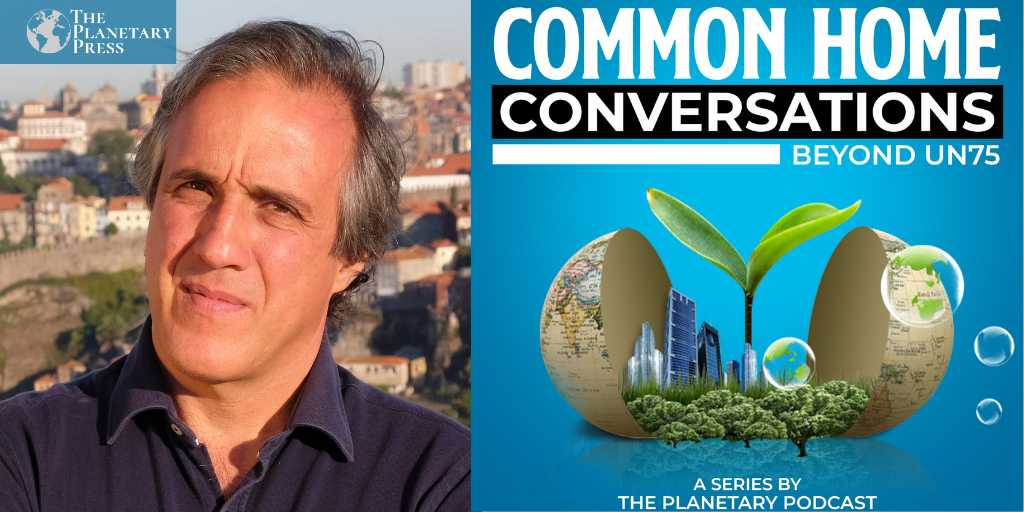Interview Transcript
Transcribed by Otter AI
Kimberly White
Hello and welcome to Common Home Conversations. Today we are joined by Paulo Magalhães, Founder and President of the Common Home of Humanity. Thank you for joining us today, Paulo.
Paulo Magalhães
Thank you. Thank you so much for your invitation, so kind. Thank you.
Kimberly White
So Paulo, can you tell us what inspired you and your organization to launch this global call for a legal framework?
Paulo Magalhães
The main idea, the starting point, was when I was confronted with a legal dysfunction, one incapacity of law to explain reality. This happened in 2002 when one oil tanker crashed on Spanish waters near the border between Portugal and Spain, in the north of Portugal. The first reaction of the Spanish authorities was trying to push the boat for Portuguese waters. The reaction of my government was to send our army boats, and the reality was that there were several boats on the water in the middle of the oil spill, and obviously, the oil went to both sides. This is the reality of having one line that is abstract, that is a legal abstraction that divides the sea. Or in others words, we cannot divide the sea; although we can divide the space of the sea, we cannot divide the water; we cannot divide the system; we cannot divide the quality of the water or the fishes. So this is really one incapacity of law to explain the reality of this planet, of this interconnected planet, for so when we lose the connection between the abstraction, and the legal figuration and the reality of the planet, we have to look for new solutions. This is what you need a new legal abstraction that is able to represent the interconnections of the planet.
Kimberly White
So, we have had agreements to address the climate crisis such as the Kyoto Protocol, and of course, the Paris Climate accord. However, we’re still struggling to move the needle. The annual emissions gap report from the UN environment released last year found that global greenhouse gas emissions must fall by more than 7 percent each year over the next decade if we’re to limit warming to 1.5 degrees. And we recently learned that we have failed to achieve any of the global biodiversity targets set a decade ago. What do you believe has prevented us from moving forward and finding the solution?
Paulo Magalhães
One of the main mistakes is our mental inability to address the global, you understand? One thing is to say words in a speech, another is that to accepted that the things are all interconnected and to build really tools that can represent this global indivisibility. It is the problem that I just talked about, the absence of one legal abstraction that is able to represent the interconnections, the interdependence of this planet, is the same reason, or is the structural reason for not achieving any results, in my view, on the climate emergency, or biodiversity. The question is, when climate for the first time entered the UN discussions in the 80s, the first question that was raised was ‘what is climate from a legal point of view?.’ Climate, as you can imagine, is something absolutely different for international law because climate is not a territory, it is a system. It is more than a system, it is a well-functioning system. It is a pattern of stability of the function of the system that is predictable, where we can have seasons, well-defined seasons, and all the years, the same pattern repeats and repeats again. And we have an envelope of temperatures that stay within these limits of temperature. A Stable Climate is, for so, a well-functioning Earth System. It is a way of functioning of the system that is favorable for humans and other species. And this model, the operating model of the system, is intangible, it is a software. It’s not a territory; it is not the territorial hardware, it is the software.
The great question is that from a legal point of view, we still look at the planet as we did in the 18th century, in the 17th century, in the 16th century, or more. The question is, we are still looking at this planet only as a territory, divided between states, where the leftovers of the territories are the global commons. And this is not true. This is not absolutely true! What makes this planet different from all the planets that we know is the system. All the planets have a territory, bigger or smaller than Earth. All the planets have a territory. What the other planets do not have, and we have here on this planet, is the system that supports life. The system, the Earth System in a well-function way or function, is our main heritage. It is our main and most valuable thing that we have on Earth because it supports life and supports us. And for the law, this system does not exist, does not exist because it’s intangible, because you cannot divide it, because we cannot appropriate it, we cannot properly privatize these things. And if we can divide the space of the sea, as we have made on the territorial waters, we can divide the space, but we cannot divide the system that operates inside the water of the oceans; we cannot divide the system that operates on the airspace, we can divide space, but we cannot divide the system. Okay? And this is the great difference. Because we do not accept that we have a global common without borders, we do not manage climate as a global common. This is the great question!
And when climate entered in the UN negotiations in the 80s, the first proposal from Malta was to propose to recognize a stable climate as a Common Heritage of Humankind. The question was in 1992, in the Rio summit, the decision was to consider climate change as a Common Concern of Humankind. And this makes all the difference. This is the main reason why we still do not have any results in tackling climate change. Because, with this decision, we decide that climate is not a common good, we decide that climate is an issue, an issue like any issue. From a legal point of view, no one knows what is a concern in terms of rights and in terms of duties. And the main question, because we do not accept that climate is a system that exists in the real world and not an issue, we do not accept that it is a global common, and we do not manage it as a global common. And the great question is again because we do not recognize the stable climate as a global public good, all the benefits produced by the biomes that maintain and produce a stable climate do not exist for the law, and for so do not exist for the economy.
For example, the question of Amazon, I call it the Paradox of Amazon. Everyone knows that the forest of Amazon is one of the key ecosystems of the planet that maintain and produce a stable climate. This forest has the highest value for humanity. A great question is that value, that everyone feels this value, everyone knows about this value, but this value is not visible for the economy. Why? Because when we talk about the value of Amazon, we are talking about the intangible work that these ecosystems and other ecosystems around the world make on the well-functioning, i.e., on the operating mode of the Earth System. This intangible work of nature is the chemical changes that the forest made on the air, on the water, on the soil, evapotranspiration, etc. And these chemical changes, this intangible work does not exist because as an asset of the utmost relevance, because the global common does not exist. From a legal point of view, this work is made in a global legal gap; the global does not exist. Law considers the global commons are only the leftovers of the territories. Sorry! This planet is more than a territory. No jurist in the world, no legal expert in the world, can say that that is not true. The truth is that this planet is more than a territory, and nature is not wrong; what is wrong is the law, the law is wrong.
Without changing this, it will be totally impossible to restore the well-functioning Earth System because we do not have a legal framework to restore a global common, no one will make improvements on a global common that does not exist, that will not be compensated for these improvements, no one will produce benefits on a legal gap. This is the great question. The result of the concern approach is not a decision to manage a global common that implies the existence of congruence between the rules of appropriation of the global commons and the rules for the provision of the global public good. We need rules for providing the global public rules and for the appropriation. Because we do not have the global common recognized, the result is one system of mitigation between states. In a system of mitigation, we will try to make less emissions, but in the end, this is a negative-sum game, and we will continue to make emissions, and this is the only way our current economy works because to make positive, to make benefits on the Earth System, to restore the Earth System it’s invisible for the economy. Without changing this rule, without changing the legal framework, we will not restore the Earth System. We will not ensure the future for the next generation.
Kimberly White
Now, when discussing an intangible global common without borders, one initial misconception regarding this deals with national borders and sovereignty. Can you address this?
Paulo Magalhães
We must understand that these are two different realities. One thing is the division of the space, and the another is the System- two different realities. And this is the great secret of the condominium. Why in a condominium, it’s possible to have common property inside the space of private property. Because they are different things. One thing is the space of my apartment. Another thing is the system of electricity or the system of water. Or the system of the elevators. One is the functional division, and another is a space division. And we can conciliate both. This is what we need to do on the planet. We need to consider the system as a global common that exists inside and outside all the sovereignties, and this does not mean that we have to finish with the borders, with the sovereignties.
To be honest, the only way to keep sovereignty under the territories is to keep the system in a well-functioning way. Without a well-functioning Earth System, there is no sovereignty that can say I do not agree with climate change. The climate change is there; the system is there; this is the reality of this planet. And this is not under the sovereignty of any state. This is not under the jurisdiction of any state. To be possible to successfully manage one common, as Professor Elinor Ostrom tells us, the first step is to define the common itself. What is the common that is at stake that we have to manage? This is the first step, and I think it is to define the Earth System as a Common Heritage of Humankind. And now, we have the scientific tools that are needed to define this Common Heritage. The Safe Operating Space for Humankind, I think, is the scientific tool to define this intangible Common Heritage of Humankind that supports life. The second step is to create congruence between the rules for appropriation and the rules for provision of the common good. Without this, it’s impossible to have a collective action. This is the structural conditions for a collective action. Climate change is not a problem of CO2. Climate change, before being a problem of CO2 or economic problem, is a problem of commons, of managing commons. Without creating the conditions to be possible, a successful management of commons, we will not address, we will not win this war against climate change. Because this is a problem that no one’s talked about, that is behind all the problems. Everyone thinks that considering climate change as a concern, as something given without question, although one knows what is a concern.
Kimberly White
So climate change is essentially a symptom, not the root cause of the illness.
Paulo Magalhães
It’s a symptom. Yeah, you are right; this is the difficulty of accepting from a sovereignty feeling that we have a common inside our territory. Independently, if you accept or not, the commons is there, its function, we have no sovereignty under the common system, and our future, the future of the next generations depend on this common good.
Kimberly White
Now historically, economic growth has come at a devastating cost to the Earth’s natural systems, or global commons. Essentially, when we destroy the environment, we create wealth with no penalty, but at the same time, there are no incentives in place to reward nature positive solutions. And recent studies have found that nature could create trillions of dollars in annual business opportunities. This system is dysfunctional. How do we reconcile economic development with growing environmental concerns?
Paulo Magalhães
And this is, again, a legal question. A legal question that is behind the conception of value, the conception of what is wealth creation in our society. We have to accept that we have a common good without borders, intangible, that is not a threat to the sovereignties, and the only way to keep the sovereignties working for the future and driving for the future. We have to accept that the climate that I have inside my country depends on what others made on the other side of the planet, it depends on the ecosystems that are in other countries. If we accept this common good, if we put some competencies in one institution that will manage its use, that I think should be United Nations, that should manage what are the positive impacts that each one makes and the negative impacts that each one makes on the common system to create the system of accountancy of these impacts, to create a global public policy of the maintenance of this stable climate, we can change the rule of the game where the wealth creation in our society only happens if we destroy nature. If we recognize the commons, we can give value to the work of nature; we can give value to the intangible work of nature. And we must distinguish that Amazon, the rainforest- I only talk about Amazon because this is the biggest- all the ecosystems produce this work.
Kimberly White
The lungs of the Earth.
Paulo Magalhães
Yeah, the question is, the forest of the Amazon belongs to the nine countries that share this space on Earth. The work that is made there is common because there are no borders for the intangible work of nature. There are no borders for the evapotranspiration; there are no borders for the absorption of CO2; there are no borders for the oxygen; there are no borders for the organic matter that goes to the water that after feeds all the oceans. There are no borders for this. But these forests belong to the countries that are there. The question is, we need to make one accountancy on the system that compensates this work. For the benefits that these territories made to all the citizens, once we all share the benefits. We all share the benefits of these ecosystems in the same way that we all share the damages of pollution or the emissions of fuels all over the place. We share the benefits, and we share the damages. So the only way to harmonize this question is to recognize the common, and after, to make a system of governance of the use of this common. And to think if we accept the benefits, if you introduce the benefits on the accountancy, all the accountancy will change. It will have cascade effects on the emissions, on the logic of the emissions, on the logic of what is on the GDP of countries. Without changing this rule, we will continue on the negative-sum game, we will try to reduce emissions, but we will never restore the system. Because we will not create one caring activity of the Earth System in the countries, and the carrying activity of the Earth System should be compensated and should become visible on the GDP of the countries. And we must have a balance between the positive impacts and the negative impacts. And the question is, if we introduce the positive impacts, what will be the consequences, the cascade effects on the negative impacts? Because this will change the rule of the game once we are touching on one initial condition of the system that will have cascading effects, that will have domino effects in all the economy, in all the relations between North and South, in all the relations inside the countries, it’s a paradigm shift. And to have results, I think it’s inevitable that we need a paradigm shift. We have so many paradigm shifts along history. Why can’t we have another one?
Think about it: we have already recognized the existence of common goods belonging to all Humanity, a legal status for the common heritage of Humankind. We have already recognized intangible legal objects of law, in outer space law. We have already defined the safe operating space with the planet boundaries framework. But, in this case, we are talking about a new kind of space. This space is not a territorial space- it’s a quality space of the system. We have now the quantitative and qualitative parameters that define a well-functioning Earth System. We have all the tools that we need to recognize the global common, to measure the impacts, to define the global common, to change. The only obstruction we still have, it is in our heads, in our mindset, that we do not accept that we have a global common without borders. This is the only obstruct we have. The obstruction between giving the opportunity for the next generations to thrive and to live in a healthy planet, or to live in the climate disruption, is one long-held belief that still does not accept that we have a global common without borders.
The great question is, we are not talking about territories. We have to leave our mindsets from the territory and embrace the idea of the system. We need to keep the borders on the territories to have peace, to maintain the peace, but at the same time, we need to build a legal framework that is able to represent the global function of the Earth System; we need something, a legal abstraction, that is not Earth System itself. When we propose to recognize the Earth System as a common heritage, we are not saying that the Common Heritage will be the Earth System. It will be a representation of the Earth System with the knowledge available now – that is the safe operating space – that is the best knowledge that we have now. The reality is, what we can have for sure is that this planet is not only a territory, and we need to represent the functionality of the system from a legal point of view and after to build a system of global governance of this global common.
So, by introducing in our accountancy, in our GDP, the work of nature, we can make a paradigm shift in the conception of what is value. And by doing so, we can build one economy not only to reduce emissions, that we are already starting to do, but also one economy of restoring the Earth System. The countries that have ecosystems, the key ecosystems of the planet, of course, they must be compensated okay, but they must be compensated because they are providing one service that supports life for everyone. And this will create new jobs, new ways of wealth creation. And, you know, you have to work on both sides reducing the impacts and restoring the ecosystems, and they will work together but to work together on both sides, you need that the results, outcomes of these works, the outcomes of these activities become visible in the economic system, in the global economic system. And do not forget, when we are investing in less emissions, in the equipment with less emissions with/or capturing CO2, you are working on intangibles, natural intangibles, like producing benefits on the Earth System, or less emissions or negative emissions by capturing CO2. So we are always working when we are reducing with new technologies to avoid emissions; we are living with intact natural intangibles, and we are living to avoid emissions of natural intangibles. So what we are talking about is about one economy of natural intangibles that are the support of life and not one economy that only produces commodities. And we should build this new economy around these natural intangibles. So it’s a new economy that will have new jobs, new economic activities that are different from the previous one, okay. So, there is no contradiction between economy and nature. The contradiction is between what we conceive as value, what we consider as wealth creation and nature. Economy is not an opposition to nature. What is the opposition is our concept of what is value for nature, what is value for an economy, what is the concept of wealth creation.
Kimberly White
Now, I think that’s a really great point. And I know the World Economic Forum recently came out with a report on how nature-positive solutions are good for our economy. So essentially shifting away from business as usual, which is a hot topic right now with COVID-19 and the green recovery, and adopting these nature-positive solutions could create trillions of dollars in annual business opportunities and create nearly 400 million jobs over the next 10 years alone. So, this will be very beneficial for us as a global community and also our local communities.
Paulo Magalhães
Yes, with some great advantages, Kimberly, there are very good technologies with zero emissions or others that are capturing CO2 with no collateral damages- or nature-based solutions. But to boost the programs of nature-based solutions, you need a legal framework that captures what are the positive externalities to have money to invest in nature-based solutions. No one will put millions and millions of dollars in nature-based solutions because the outcomes of nature-based solutions are natural intangibles that spread globally and benefit the whole Earth System and everyone on a global scale, and for so, these investments needed to be compensated in a system of common governance. So, to talk about one conflict between the economy and nature is absolute madness, in the sense that the problem is not economy. The problem is what has value. And I ask again, what has value for humankind? More iPods or more commodities or more the biogeophysical conditions that support life? We can continue to produce commodities, we need to produce commodities, but we need to produce less commodities and to produce more intangibles, the natural intangibles that support life because without this, in the end, no one will earn money, because the system will collapse. So, the problem is the system of what has value for us, what really matters for us, okay, this is the question we give value to what? And although it is evident for us, but the natural systems do not change. The only one that can change is economy, the one that can change is the law, the laws of nature will not change. So the only solution is to adapt our laws, to adapt our economy to support life and the next generations. There is no excuse not to do it. There is no excuse.
Kimberly White
I like that- we must change because the laws of nature will not change. Thank you, Paulo. This was enlightening. Do you have any final thoughts to share with our audience?
Paulo Magalhães
Yes, yes. We can manage the system without undermining the territory, the sovereignty of states. This is from a legal point of view, from a political point of view, one new solution, because this is the time also to connect the new science about the function of the Earth System, the reality of the Earth System, with the legal concepts, with the political solutions, with the designing of policies, and the designing of organic institutions, of institutions designing global governance, so only connecting of all of these science, with law, with the consequences in economy, by recognizing the work of nature that support life, and also connecting with the political and institutional solutions that we need to manage the system. This is the new society that we need, the evolution that we need to have an Earth System in a state where we can live, where the next generations can live. We cannot think that in the Anthropocene, we will live in the same way, with the same thought that we lived ten years ago, twenty years ago, five years ago. And also do not forget, that all that we are seeing now, the nationalisms are also one outcome of not having a solution for this fact we are all connected, that we depend on each other on a global scale. And because we have no solutions for this, we have no governance design for this reality of the planet, that the outcome is that each one is trying to close themselves in their borders thinking that this is the best solution for them. And we know that this, this is not true. Climate change, pandemics do not respect any border. For so, only by building something that represents a world without borders, the systemic approach, and keeping the borders on the territory and allowing the system to exist without borders, we can find new solutions.
Kimberly White
All right, and there you have it. Our planet is more than a territory, and the great quest moving forward is to recognize the existence of the Earth System as a Common Heritage of Humankind. By recognizing our global commons, we can give value to the intangible work of nature and take the first step to restoring a stable climate, a visible manifestation of a well-functioning Earth System. That is all for today, and thank you for joining us for this episode of Common Home Conversations Beyond UN75. Please subscribe, share, and be sure to tune in next Wednesday to continue the conversation with our special guest, Karl Burkart, Co-Founder and Managing Director of One Earth. And visit us at www.ThePlanetaryPress.com for more episodes and the latest news in sustainability, climate change, and the environment.







